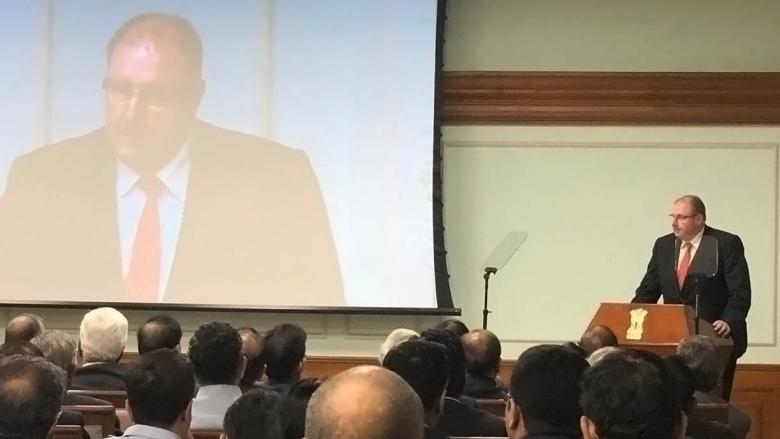Honorable Prime Minister;
Honorable Minister of Finance and Corporate Affairs;
Honorable Minister of Commerce and Industry and Civil Aviation;
Honorable Minister of State for Commerce and Industry;
My friend Mr. Ramesh Abhishek, the Secretary of the Department of Industrial Policy and Promotion;
Friends and colleagues from the private sector:
I am pleased to join you today to celebrate India’s remarkable achievements in promoting business reforms, and the stellar results that these efforts have borne in terms of performance in Doing Business.
Last November, in a similar event, our Chief Executive Officer Kristalina Georgieva observed that business reforms are a marathon and not a sprint.
I am therefore pleased to join you here, just over a year later, at the next milepost of the business reforms marathon, to celebrate these results with you.
This persistence, consistent focus, drive and desire are at the heart of the results we are celebrating today. This celebration would not have been possible without the leadership of the Prime Minister and the Cabinet; the dedication of DIPP and the Government departments, and the hard work of all of the reform champions who have contributed towards the journey of India from the 6th rank in South Asia in 2014, to number 1 today.
The video showed, and it is worth emphasizing, that [1].
To me, the overwhelming message of this year’s Doing Business report is that persistence pays off. The major improvements this year, in the areas of construction permits and trade, are the culmination of four years of efforts by a number of reformers, working hand-in-hand with the private sector and with their beneficiaries.
But don’t take my word for this. Take what Ankit Goel, an architect from Delhi, said in a testimonial about the Construction Permit process that now corrects mistakes within minutes instead of five working days. He wrote: “This is an example of efficient public service and accountability in the truest sense.”
The coordination mechanisms, outreach strategies and feedback loops have proven integral to the reforms that have propelled India’s rank. These will be even more critical in the coming years, especially as we attempt to address more difficult reforms in land administration and judicial reforms, which will be required to further improve India’s performance in Doing Business in coming years.
Global experience shows that such improvements can have a major real impact on the economy.
Extrapolating this data to India, this means that the improvement could mean that
These 60 additional new businesses can have a major impact: they create the jobs to employ India’s youth, the incomes to help reduce poverty and boost shared prosperity, and the improved livelihoods of the employees and their families.
Additionally, the efforts of the Government of India to broaden and deepen the reform agenda, by stimulating reforms across all states and districts, are not only necessary but can also contribute greatly to improving the lives of businesses.
I can also attest to the fact that the world is watching India’s reform journey, and is keen to learn from your experience. My colleagues and I have been approached by a number of countries, including China, Nigeria, South Africa and Indonesia, who are keen to learn from India’s experiences in business reform.
There remain many miles to go in this marathon, and in addressing all the constraints that continue to inhibit the ability of the private sector in India to grow and thrive.
[1] Bhutan improved from 141 in DB2014 to 71 in DB2016. Djibouti improved from 171 in DB2017 to 99 in DB2019.
Last Updated: Nov 19, 2018

